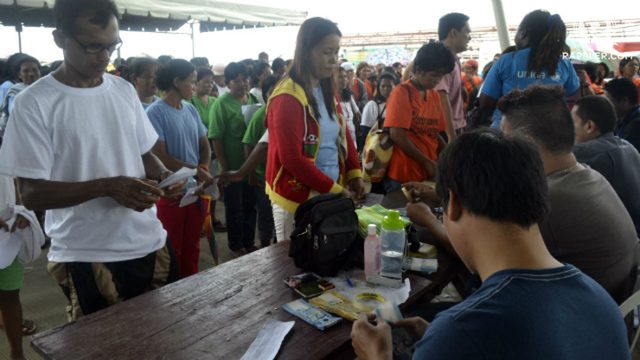SUMMARY
This is AI generated summarization, which may have errors. For context, always refer to the full article.

MANILA, Philippines – The Philippines has made progress in ensuring that its most vulnerable citizens are protected, according to a new study by the Asian Development Bank (ADB).
In the latest edition of its Social Protection Index (SPI), the ADB cited the Philippines as one of the 6 Asian nations that made significant progress between 2005 and 2012.
“The Philippines has been making steady progress toward universal health insurance, while also providing extensive social assistance to children and the poor,” the ADB said.
The country began with a fairly low SPI of only 1.4% of GDP per capita in 2005. By 2012, its SPI had improved to 2.2%, a gain of 0.8 percentage points.
The SPI is a ratio derived by dividing total expenditures on social protection by the total potential beneficiaries. This ratio is compared with a country’s GDP.
The ADB study looked at the progress of central government support for social insurance, such as pensions and health insurance; social assistance, such as child welfare programs and assistance to the elderly; and labor market programs, such as cash-for-work programs, across 25 Asian countries.
The SPI report, for the first time, also assessed progress on social protection over time by tracking spending for 14 countries in Asia between 2005 and 2012.
The ADB said the Philippines is “note-worthy for having made progress on both social assistance and social insurance between 2005 and 2012.”
While it pointed out that the country’s SPI for social assistance increased from only 0.1% of GDP per capita to 0.4%, it explained that the advance was due largely to the expansion of the Conditional Cash Transfer (CCT) Program, targeted at improving the health, nutrition, and education of children.
The country’s CCT Program or the Pantawid Pamilyang Pilipino Program (4Ps) has lifted an estimated 7.7 million Filipinos out of poverty, according to the World Bank.
The ADB highlighted that the Philippines’ most pronounced progress was in social insurance, where its SPI rose to 1.8% of GDP per capita from 1.3%.
This progress was largely due to the expansion of PhilHealth, a universal health insurance program which was broadened to benefit over 44 million Filipinos.
“Though such an advance has been heavily subsidized,” the ADB said, “it still represents a remarkable achievement for a lower-middle-income country.”
PhilHealth has been boosted by the sin tax law which mandates that 85% of the revenue raised goes toward subsidizing the program, and as of early this year it has built up a cash reserve of P128 billion.
The extra funds have also allowed PhilHealth to expand its coverage. It recently announced a new program that will increase benefits for overseas Filipino workers.
The ADB said the increase in universal health insurance has allowed the Philippines to record a 44.1% increase in breadth of social coverage, or the amount of people covered, between 2005 and 2012. The country ranks 3rd highest in terms of expansion, only behind Mongolia and China.
This, however, is tempered by a slight decline of 0.1% in terms of depth of social coverage.
More protection needed
Despite the progress, the ADB said the level of government spending on social programs across the 25 Asian countries is still far too low to ensure sufficient coverage for most of the population.
Based on the study, the average government expenditure on social protection programs in Asian countries is equivalent to 3.7% of GDP per capita. The Philippines trails this mean with an expenditure of 2.6%.
To bridge the gap, the study recommended more ambitious active labor market programs, as these tend to be small and weak in most countries.
It also said that unemployment insurance and social assistance benefits must be extended to include employment promotion measures such as vocational training and support for entrepreneurship. – Rappler.com
Add a comment
How does this make you feel?
There are no comments yet. Add your comment to start the conversation.